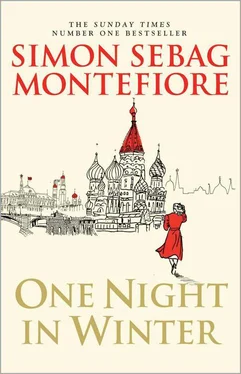The door to the left opened and the stink of fresh human dung made Andrei’s eyes water even before Peshlauk, an antique but indestructible colossus, staggered out, pulling up his giant-girdled trousers. ‘I’ve delivered a veritable baby in there!’ he boasted.
Another of the Goldberg children – how many were there: four, five? A plague of undernourished rats – shoved past Andrei. ‘Hey, don’t push me,’ he said, but then he remembered that no one in the Soviet Union respected personal space. Everyone existed in a state of neurotic anxiety, but as his mother always told him: The key to survival is to be calm and save yourself. Never ask anyone what they did before and what they’re doing next. Never speak your mind. And make friends wherever you can .
‘Mama!’ Andrei went into their little room with its two campbeds packed close together. It often smelled like a rabbit hutch but it was in Moscow and it was theirs.
‘Just close the door,’ said Inessa, who lay on her bed, reading about the Japanese war in Pravda. The European war was over and now Stalin was in on the kill of Japan. She patted the bed next to her. ‘Tell me about the school.’
‘Have you got any food?’
‘Of course, Andryusha. You must be so hungry. Cheese and black bread. Have a look in Aladdin’s Cave.’
Andrei climbed over the other bed and, crouching down, edged a breeze-block out of the wall and brought out the cool cheese. Their apartment had no fridge. In winter they kept their milk fresh by hanging it out of the window, but in summer, this was the best way to preserve perishables, as well as keeping it out of the hands of the Goldberg children or Peshlauk’s churning bowels.
Inessa smiled weakly as she watched him eat and when he’d regained his energy, he beamed at her.
‘Good news, Mama! I’m accepted into the school and my fees are paid!’
‘Oh darling.’ She hugged him, and then looked anxious. ‘Who by? What’s going on?’
Andrei told her exactly what had happened, and watched as his mother’s uneasiness cleared. Surely this was evidence of a new era? And a new era meant the return of Andrei’s father.
‘Andrei,’ she whispered, moving closer to him. ‘Do you think…’
‘Don’t think, Mama. How often have you told me that?’
‘Yes, but…’
‘Don’t hope, because if we’re disappointed again, it’ll kill us one more time.’
She nodded, and dabbed her eyes. Quickly, to change the subject, he told her about the school: about the director, and Dr Rimm – yes, every school had a few of those – and then he described the literature teacher Golden. ‘I’ve never had a lesson like that. It was such fun. He brought it to life and there was something in the way he talked about poetry…’
‘A teacher like that in a school like yours… something’s really changing,’ she said.
‘And, Mama, he said he’d only just returned to Moscow too.’ She was about to ask more about Golden but by now, he was describing Serafima (her eyes, the way she dressed), the airy swagger of George, and creepy Nikolasha and his Gothic retainers, Vlad and Rosa.
‘Be careful of these princelings,’ Inessa was telling him. ‘Factions are dangerous, Andrei. Remember whose children they are…’
But Andrei wasn’t listening: he was already on his way to the bathroom with his satchel. No one was in there because no one in their right mind would visit it after Peshlauk – but he didn’t care.
He locked the door. He could actually taste the shit in the air and he didn’t dare look down into the bowl, but just sat on the edge and, like a miner who has stolen a diamond, he pulled out his treasure, titled the Velvet Book of Love. It was just a plain exercise book with velvet glued on to the covers. But it was new and Nikolasha had only just started writing in it.
Agenda for the Summer Term
Top Secret
Thoughts on our new literary movement: the Fatal Romantics’ Club, founded December 1944 by me, Nikolasha Blagov. I shall record our meetings, rules and thoughts in this book.
So, thought Andrei, Nikolasha has a little club. Most schools had literary and theatre clubs, but this seemed different. He read on: Membership: secret .
Not that secret! Vlad and Rosa had to be members too, maybe Serafima, and certainly George.
Our inspiration: Pushkin
Our moments in history: just as for Christians, the Crucifixion of Christ is the moment. For us it is 1837, the death of Pushkin in a duel.
Our favourite teacher: Teacher Golden
A knock on the bathroom door made Andrei jump. He had forgotten where he was. The book showed that something, perhaps the war, perhaps their privilege, had changed these children, and allowed them the freedom to take a risk.
‘Are you going to be long?’
It was Kozamin the bus conductor.
Andrei gave a bovine groan, one of the repertoire of noises essential to communal living. ‘Five minutes. Aaaagh!’
‘Take your time,’ said Kozamin.
We declare:
1. We suffocate in a philistine world of science and planning, ruled by the cold machine of history.
2. We live for love and romance.
3. If we cannot live with love, we choose death.
This is why we conduct our secret rites; this is why we play the Game.
The Game! Andrei smiled to himself but he narrowed his eyes and reread it. Could this have been written with a hint of cunning to conceal its real spirit? These days, everything – from the government announcements in the newspapers to the tedious ramblings of teachers – was in a hieroglyphic code. Nothing quite meant what it said – and sometimes it meant the exact opposite. But Nikolasha’s target was obvious. Science and planning. That was the Communist Party. The cold machine of history. Communism. Love and romance. That was what Communists called ‘bourgeois sentimentalism’.
Andrei put down the book. In the adult world, in a more oppressive time like 1937, this might have been dangerous anti-Soviet talk. But things had become much more easy-going in the war. No one could take Nikolasha’s silly writings seriously, could they? Still, he remembered the wisdom of his father and his mother’s warnings. These children were not of his world, and yet he longed to know them better.
‘MAY I HAVE a word?’ Andrei said to George. They were in school a few days later, and the bell for lunch had just rung.
‘A word?’ George turned round as he followed Nikolasha and Vlad out of the classroom.
‘It’s private.’
‘Private? How can it be?’
No grand duke of the old days, thought Andrei, could equal the sneering haughtiness of a Communist prince.
‘You’ve lost something and I’ve found it.’
George frowned. ‘Something containing mysterious scribbles?’
Andrei nodded.
‘I’ll be with you in a second,’ George called over to Minka and Serafima, who were waiting for him, sandwich boxes in hand. ‘Come with me.’ And he pulled Andrei through the washrooms into the room where sports equipment was stowed, and school mischief hatched.
‘Thank God you’ve got it,’ George said, looking a good deal less confident than he had a minute earlier. ‘Nikolasha makes such a big thing of it. He keeps asking for it back, but I keep telling him I’m still studying it with sacred passion.’
‘Well, here it is,’ said Andrei, drawing the book out of his satchel.
‘You’ve rescued me,’ said George. Andrei held out the book and George put his hands on it and turned breezily to go – but when he tried to take it, he found that Andrei was still gripping it. ‘What are you doing?’ asked George.
Читать дальше












